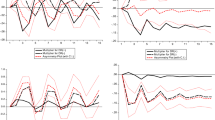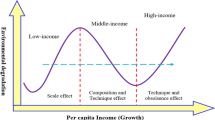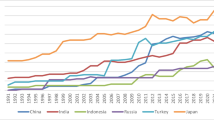Abstract
Maintaining a balance between environmental quality and economic growth is now one of the common goals of fiscal and monetary policies in developed and develo** economies. This study examines the asymmetric impacts of fiscal and monetary policy instruments on environmental pollution in Pakistan over the period 1985–2019 by employing the asymmetric or nonlinear autoregressive distributed lag (NARDL) framework. The outcomes indicate that in Pakistan, a positive and negative shock in fiscal policy instruments has a significant increasing influence on carbon emissions in the short run, while a positive and negative shock in fiscal policy instruments has a significant decreasing impact on environmental pollution in long run. However, negative and positive shock in monetary policy instruments enhances carbon emissions in short-run, whereas positive shock in monetary policy instruments decreases carbon emissions in the long run. Therefore, the policymakers may consider the usage of fiscal and monetary policy instruments to maintain economic growth along with lowering the environmental pollution.



Similar content being viewed by others
Data availability
The datasets used and/or analyzed during the current study are available from the corresponding author on reasonable request.
References
Adewuyi AO (2016) Effects of public and private expenditures on environmental pollution: a dynamic heterogeneous panel data analysis. Renew Sust Energ Rev 65:489–506
Annicchiarico B, Di Dio F (2017) GHG emissions control and monetary policy. Environ Resour Econ 67(4):823–851
Balcilar M, Ciftcioglu S, Gungor H (2016) The effects of financial development on Investment in Turkey. Singap Econ Rev 61(4):1650002–16500018
Chan YT (2020) Are macroeconomic policies better in curbing air pollution than environmental policies? A DSGE approach with carbon-dependent fiscal and monetary policies. Energy Policy 141:111454–111468
Chen C, Pan D (2020) The Optimal Mix of Monetary and Climate Policy. MPRA Paper No 97718
D’souza R, Rana T (2020) The Role of Monetary Policy in Climate Change Mitigation. Observer Research Foundation: ORF issue brief No. 350
Dongyan L (2009) Fiscal and tax policy support for energy efficiency retrofit for existing residential buildings in China’s northern heating region. Energy Policy 37(6):2113–2118
Halkos GE, Paizanos EΑ (2013) The effect of government expenditure on the environment: an empirical investigation. Ecol Econ 91:48–56
Halkos GE, Paizanos EΑ (2016) The effects of fiscal policy on CO2 emissions: evidence from the USA. Energy Policy 88:317–328
International Monetary Fund (2019) International Featured Standards 2019. International Monetary Fund Publications
Jalil A, Feridun M (2011) The impact of growth, energy and financial development on the environment in China: a cointegration analysis. Energy Econ 33(2):284–291
Katircioglu S, Katircioglu S (2018) Testing the role of fiscal policy in the environmental degradation: the case of Turkey. Environ Sci Pollut Res 25(6):5616–5630
Liu Y, Han L, Yin Z, Luo K (2017) A competitive carbon emissions scheme with hybrid fiscal incentives: the evidence from a taxi industry. Energy Policy 102:414–422
Lopez R, Galinato GI, Islam A (2011) Fiscal spending and the environment: theory and empirics. J Environ Econ Manag 62(2):180–198
Lopez R E, Palacios A (2010) Have government spending and energy tax policies contributed to make Europe environmentally cleaner? Working paper no 1667-2016-136345
McAusland C (2008) Trade, politics, and the environment: Tailpipe vs. smokestack. J Environ Econ Manag 55(1):52–71
Pesaran MH, Shin Y, Smith RJ (2001) Bounds testing approaches to the analysis of level relationships. J Appl Econ 16(3):289–326
Rausch S (2013) Fiscal consolidation and climate policy: an overlap** generation’s perspective. Energy Econ 40:S134–S148
Shin Y, Yu B, Greenwood-Nimmo M (2014) Modelling asymmetric cointegration and dynamic multipliers in a nonlinear ARDL framework. In: Festschrift in honor of Peter Schmidt. Springer, New York, pp 281–314
Ullah S, Majeed MT, Chishti MZ (2020) Examining the asymmetric effects of fiscal policy instruments on environmental quality in Asian economies. Environ Sci Pollut Res: 1-13
World Bank (2019) World development indicators 2019. World Bank Publications
Yuelan P, Akbar MW, Hafeez M, Ahmad M, Zia Z, Ullah S (2019) The nexus of fiscal policy instruments and environmental degradation in China. Environ Sci Pollut Res 26(28):28919–28932
Author information
Authors and Affiliations
Contributions
Sana Ullah and Sidra Sohail analyzed the data and wrote the complete paper. Ilhan Ozturk read and approved the final version.
Corresponding author
Ethics declarations
Conflicts of interests
The authors declare that they have no conflict of interest.
Ethical approval
Not applicable
Consent to participate
I am free to contact any of the people involved in the research to seek further clarification and information
Consent to publish
Not applicable
Additional information
Responsible Editor: Philippe Garrigues
Publisher’s note
Springer Nature remains neutral with regard to jurisdictional claims in published maps and institutional affiliations.
Rights and permissions
About this article
Cite this article
Ullah, S., Ozturk, I. & Sohail, S. The asymmetric effects of fiscal and monetary policy instruments on Pakistan’s environmental pollution. Environ Sci Pollut Res 28, 7450–7461 (2021). https://doi.org/10.1007/s11356-020-11093-4
Received:
Accepted:
Published:
Issue Date:
DOI: https://doi.org/10.1007/s11356-020-11093-4




